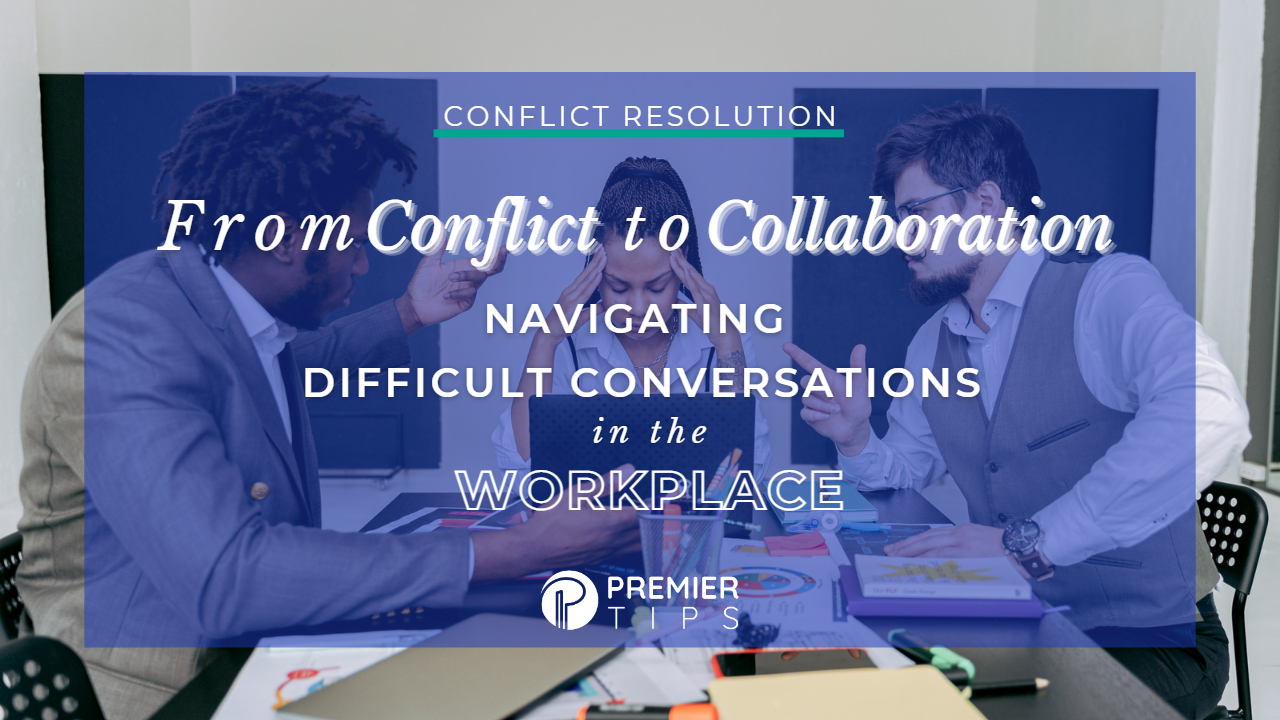From Conflict to Collaboration: Navigating Difficult Conversations in the Workplace
Navigating workplace communication can be a challenging task for any business. Conflicts and difficult conversations can arise between coworkers, managers and subordinates, or different departments within a company. These situations can be uncomfortable, stressful, and can create tension, affecting productivity in the workplace. However, avoiding these conversations can also lead to resentment, misunderstandings, and a lack of trust among team members. As a business language coach, I have witnessed firsthand how conflicts can harm a business and its employees. That's why, in this article, we will discuss effective strategies for navigating difficult conversations in the workplace and turning conflicts into opportunities for growth.
In this article, we'll explore the common sources of conflict in the workplace, the importance of effective communication, and practical strategies for managing difficult conversations. By mastering these skills, professionals can build stronger relationships with their colleagues, resolve conflicts, and foster a positive work environment. Let's dive in and learn how to turn challenging conversations into opportunities for collaboration and growth.
In today's fast-paced work environment, conflict resolution has become a crucial skill. As an employer or employee, understanding the sources of conflict in the workplace is essential in creating a harmonious work environment. This is where effective communication and conflict resolution skills come into play.
One of the main sources of conflict is personality differences. Each person brings their own unique set of experiences, opinions, and beliefs to the workplace. As a result, conflicts can arise when these differences clash. Understanding the personalities of your colleagues can help you avoid conflicts and promote positive working relationships.
Another source of conflict is communication style. Communication is a complex process, and misunderstandings can occur when people have different communication styles. For example, someone who prefers to communicate directly may find it challenging to work with someone who is more passive in their communication style. Understanding these differences can help you communicate more effectively and avoid misunderstandings.
Values are also a significant source of conflict in the workplace. Conflicts can arise when individuals have different values or priorities. For example, someone who prioritizes work-life balance may have a conflict with a manager who prioritizes productivity. Understanding these values can help you navigate conflicts and work together more effectively.
It is essential to note that not all conflicts are destructive. Constructive conflicts can lead to creative solutions and improved teamwork. However, if conflicts are left unresolved, they can create a toxic work environment, harm employee morale, and negatively impact productivity. It is, therefore, critical to address conflicts quickly and effectively.
Understanding the sources of conflict in the workplace is essential in creating a positive and productive work environment. By recognizing and addressing conflicts, individuals can improve communication, promote teamwork, and increase productivity. At Premier English we help our clients understand the patterns that create conflict in their workplace. Contact us to transform your workplace challenges into opportunities that can help you and your team.
Once you understand the sources of conflict, it's time to develop strategies for navigating difficult conversations. Here are some practical tips you can use for navigating difficult conversations in the workplace:
1. Active Listening
Listen actively by paying attention to what the other person is saying, trying to understand their perspective and feelings, and avoiding interrupting or dismissing their opinions.
2. Empathy
Try to put yourself in the other person's shoes and understand their perspective. This can help you respond in a way that is more compassionate and understanding.
3. Stay calm and focused
When you feel yourself getting emotional, take a step back and take a few deep breaths. This can help you stay centered and focused on the conversation.
4. Use non-confrontational language and phrasing
Instead of using confrontational language that may escalate the situation, use non-confrontational language and phrasing. For example, say "I see things differently" instead of "You're wrong."
5. Be specific and to the point
Misunderstandings can easily occur when communication is vague or incomplete. Be specific and concise when communicating to avoid misunderstandings.
6. Find common ground
Look for areas where you and the other person can agree or find common ground. This can help build a foundation for collaboration and problem-solving.
7. Focus on solutions, not problems
Rather than focusing on what went wrong, focus on finding solutions to the problem. This can help shift the conversation from blaming to problem-solving.
8. Follow up
After a difficult conversation, it's important to follow up and ensure that any agreed-upon solutions are being implemented. This can help prevent future conflicts and build trust between team members.
By following these practical tips, you can effectively navigate difficult conversations and resolve conflicts in the workplace. Remember, effective communication is key to fostering collaboration and building strong relationships within your team. If you need any help, don’t hesitate to contact us for a consultation on how we can help you improve your communication skills and face challenges in the workplace.
In collaborative problem-solving, everyone involved has a stake in the outcome. For example, when two departments in a company have conflicting goals, collaborative problem-solving can help find a solution that benefits both departments. By working together and leveraging each other's strengths, departments can find creative solutions that might not have been possible if they had worked in isolation.
Effective communication is a critical component of collaborative problem-solving. By actively listening to others, being open-minded, and sharing ideas and feedback in a constructive way, employees can build trust and respect among coworkers. This creates a positive working environment where conflicts are handled constructively and everyone feels valued and heard.
Collaboration requires a willingness to compromise and be flexible. It's important to approach conflict resolution with an open mind and a desire to find a solution that benefits everyone. This means being willing to make concessions and work towards a solution that may not be perfect but is acceptable to everyone involved.
Turning conflict into collaboration is a powerful approach to resolving conflicts in the workplace. By focusing on collaboration, employees can develop valuable communication and conflict-resolution skills that benefit both themselves and their organizations. Through effective communication and a willingness to collaborate, professionals can find win-win solutions that lead to improved relationships, increased productivity, and better outcomes for all involved. If you are facing communication obstacles that are creating conflict in your workplace, contact Premier English for a consultation to evaluate strategies for improving workplace communication that can help your team. After one of our workshops for a client and implementing the skills learnt in our training program, their team began to see significant improvements, being able to understand each other's perspectives and work collaboratively to achieve their goals.
In summary, navigating difficult conversations in the workplace is crucial for personal and professional growth. Strategies such as active listening, staying calm and focused, using non-confrontational language, and empathy can be effective in resolving conflicts. Collaborative problem-solving can lead to win-win solutions that benefit everyone involved. Effective communication is essential in building trust and fostering collaboration. Premier English helps professionals and companies improve their communication skills and navigate conflicts successfully through business language coaching services and workshops. Contact us and let us help you create a culture of communication and collaboration today.
GOOD LUCK!
#WorkplaceCommunication #ConflictResolution #Teamwork #Collaboration #Productivity #WorkplaceGrowth #DifficultConversations #ConstructiveConflicts #Opportunity #BusinessCoaching #PremierEnglish #BusinessCommunicationCoaching
#BusinessCommunication #EffectiveCommunication #ProfessionalEnglish #ExecutiveCoaching #PremierTips #PremierEnglish #PremierEnglishUK #SheidaRad





